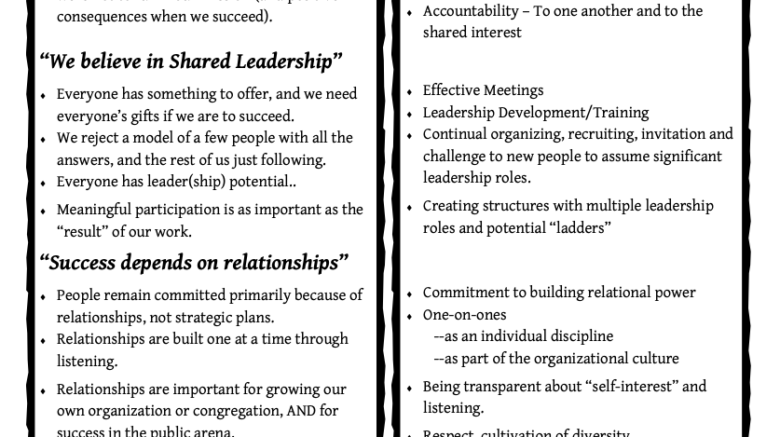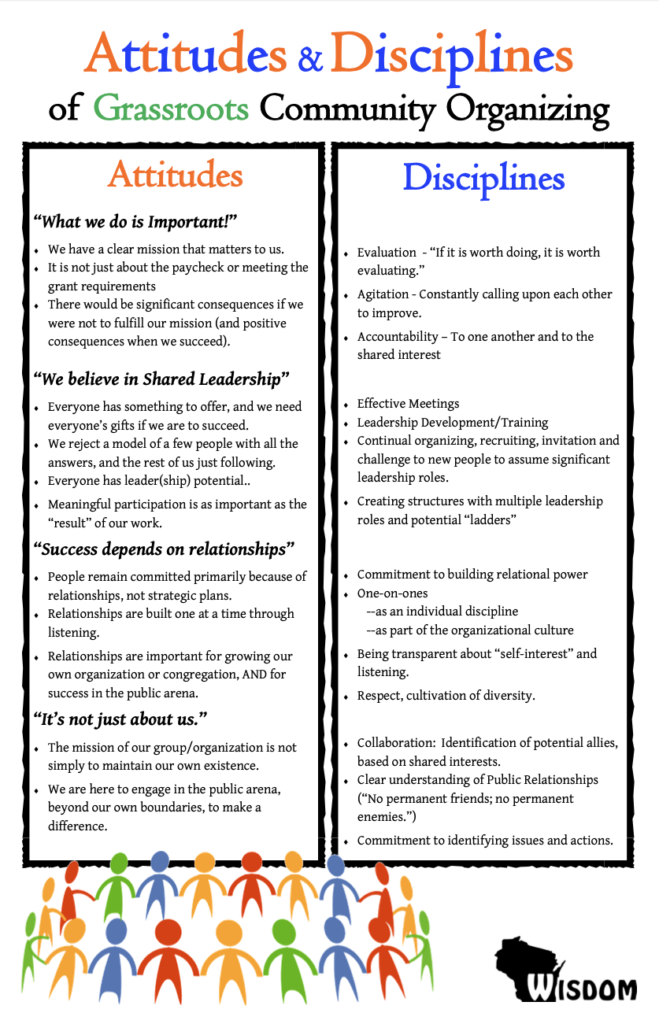By Lynn Buske, JONAH Organizer
Many of our followers, no matter how long they’ve been part of JONAH, aren’t familiar with our organizing techniques and terminology simply because we don’t talk about them enough. This section of our JONAH Journal will hold short snippets to help you understand more about our organizing model.
Are you familiar with our organizing Attitudes and Disciplines? These come to us from Gamaliel (through WISDOM). I particularly want to focus in this article on attitude number four – “It’s not just about us.”
Sometimes I’ve wanted to remind people that our work isn’t just about others, either – it’s easy to enter advocacy work from a selfless place of “I just want to help,” and forget that there is something we get out of doing this work, too (there has to be, in fact, to keep it sustainable).
But lately I’ve been noticing that not only is nearly everyone who comes to JONAH passionate about something, and impacted in some way by it, but that passion can gobble us up and take us away from the value that sits behind our efforts. If our passion steers the ship we can work blindly, solo, and/or burnout.
Both sides of these coins – the for me and for other – are unconscious and we need to remember them, but there is something greater to focus on that can put both of these in check: The very fact that this work exists and that we are working together IS FOR EVERYONE. We are not just here for ourselves, nor just for the impacted people we know, or for NOT the people that we’re angry at – everyone (which includes you, too). Let’s look at how this principle shows up in our work. Here’s the attitude and its disciplines:
“It’s not just about us.”
- The mission of our group/organization is not simply to maintain our own existence.
- We are here to engage in the public arena, beyond our own boundaries, to make a difference.
Disciplines used to practice this are:
- Collaboration: Identification of potential allies, based on shared interests.
- Clear understanding of Public Relationships (“No permanent friends; no permanent enemies.”)
- Commitment to identifying issues and actions.
Reverend Sandra McKinney used to always tell me that our goal was to work ourselves out of being needed. JONAH’s existence is not more important than the work that is met. I challenge anyone who is a part of a group they are proud of – would they give up that group’s existence for the betterment of all, for a larger vision?
Additionally, we know that this work is about our larger community and our larger world and, thus, we have to enter it and go outside our boundaries, outside our little bubbles, to have a true impact.
Those points seem easy enough to get on board with, right? But they are slightly different than what we’re used to seeing, they are deeper, and need some discipline to keep us on that track.
The first discipline here is collaboration. I often think we don’t truly realize how fully this is meant to be taken. David Liners, Director of Wisdom, once said something like “inclusion is more important than the work itself”. This is because we do our best work when we really come together and consider all perspectives. Continually growing our table to include more allies and more voices looking toward a specific goal is how we demonstrate that it’s not just about us. We recognize that others feel the same and that our ideas aren’t the only ones. Collaboration also tends to hold us more accountable – which if we really mean it when we say we want to make a difference we are willing to be accountable.
Elaborating on the public relationships discipline, if it’s NOT about YOU then when collaborating don’t take things personally! I run into this very human response internally (myself and our teams) and in our partnerships. This of course includes being respectful of our public relationships because while we aren’t necessarily “friends” in our work together we certainly are never interested in making people intentionally an “enemy” or upset enough that they never want to work with us. This discipline is truly about focusing on the importance of the issue at hand because of how everyone is impacted by it. Nothing we do in partnership is personal. We may have personal reasons for being there but they cannot cloud our mission. When we are called out for our actions it is not because “I am not enough” it is just because “there is more to do together.”
The last discipline recognizes that there is much work to be done and, while boundaries are important for each individual, as an organization we can’t just NOT do something because “it’s too much” or “too hard” or “too controversial” or “I’m too tired”. I am continually motivated by the fact that this work is much bigger than me – a huge reason we are faith-based. This gets me at least to say “well if I can’t, who can I ask that can?” and “I don’t know much but I’m willing to talk about it” and if something doesn’t work to “try again”.
The world is constantly changing, the needs are expanding, what actions will be effective are evolving, and who wants to be involved is growing. We also need to be willing to change, expand, seek and include. What can we continually learn?
A discipline I’d maybe add to this list based on my almost 5 years of organizing experience is: It’s important to go where it’s uncomfortable (if it’s for the betterment of all and in-line with our self-interest).
If our goal is truly making the community better for every ONE so it is better for everyone, we have to keep reminding ourselves of that and let it get us outside of ourselves and into expanded places. I must also mention that this work is more about GOD – the greater us. How much is GOD truly steering our ship? Sit with this “It’s not just about us” in the back of your mind for this month, and see how it subtly evolves your work.


